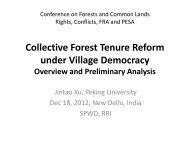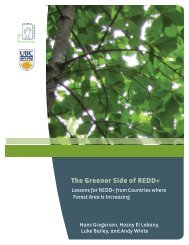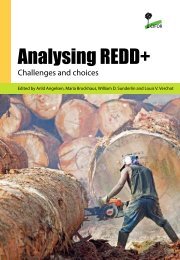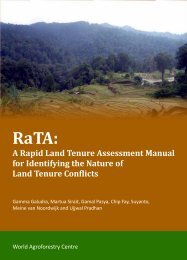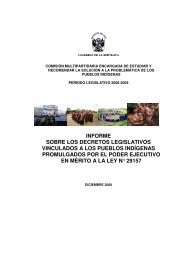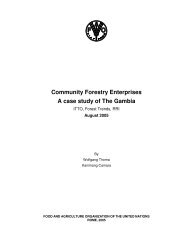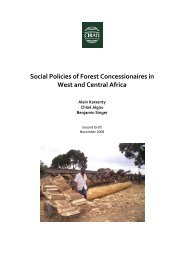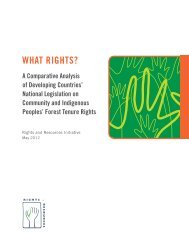An investigation into forest ownership and customary land ... - Fern
An investigation into forest ownership and customary land ... - Fern
An investigation into forest ownership and customary land ... - Fern
You also want an ePaper? Increase the reach of your titles
YUMPU automatically turns print PDFs into web optimized ePapers that Google loves.
Summary<br />
rights, to be upheld by the courts to the same degree as other private rights,<br />
registered or not yet registered, <strong>and</strong> subject to full compensation in the event<br />
of compulsory acquisition for genuine<br />
public purposes. Procedures for securing<br />
the consent of communities for alienating<br />
their l<strong>and</strong>s need revisiting.<br />
A new tenure arrangement more suited to<br />
<strong>customary</strong> property norms is also required.<br />
This is less critical for the basic entitlement<br />
of the community as l<strong>and</strong>owner<br />
than to cater to the needs of individuals<br />
<strong>and</strong> families seeking greater security of<br />
tenure over respective parcels within the<br />
community property (such as for farms<br />
<strong>and</strong> houses). Under the current system, their establishment of title alienates these<br />
parcels entirely from community <strong>ownership</strong> <strong>and</strong> jurisdiction; this allows elites to<br />
fail to use the l<strong>and</strong> for the purpose claimed <strong>and</strong> opens the way to l<strong>and</strong> hoarding<br />
<strong>and</strong> speculation. A <strong>customary</strong> leasehold of<br />
There is no basis in the<br />
constitution or property<br />
law to render <strong>forest</strong><br />
resources the property of<br />
the state<br />
,,<br />
The choice is not between<br />
meeting social rights<br />
or serving the needs of<br />
investment <strong>and</strong> growth,<br />
but in the restructuring<br />
of resource tenure <strong>and</strong><br />
governance to allow the<br />
two to serve each other<br />
,,<br />
varying duration <strong>and</strong> conditions, drawn<br />
from a founding collective <strong>customary</strong> deed<br />
of <strong>ownership</strong>, would be more appropriate.<br />
Several African States have developed<br />
forms in recent years which fulfil such<br />
requirements, <strong>and</strong> these deserve scrutiny<br />
for their usefulness to Liberia.<br />
33<br />
<strong>An</strong>other change will be to reconstruct l<strong>and</strong><br />
classes. Tribal l<strong>and</strong> is best conceived as community l<strong>and</strong> <strong>and</strong> distinct from public<br />
l<strong>and</strong>, itself necessarily defined as national property acquired for genuinely public<br />
purposes (schools, roads, service centres, etc.). Amendments to the Public L<strong>and</strong>s<br />
Law, still fashioned around the needs of immigrants in the mid 19th century,<br />
need to follow.<br />
Catching up with justice <strong>and</strong> the dem<strong>and</strong>s of the people<br />
Rural Liberians should also be supported in attempts to formalise their collective<br />
<strong>ownership</strong>. While systematic titling rightly raises alarm given its poor record<br />
across the continent, the conditions <strong>and</strong> dem<strong>and</strong>s in Liberia suggest there could<br />
be a different outcome. The number of parcels referred to in the first instance<br />
is few; areas administratively designated as clan areas number fewer than 1,000



